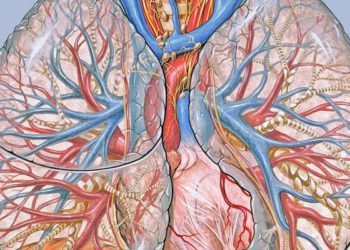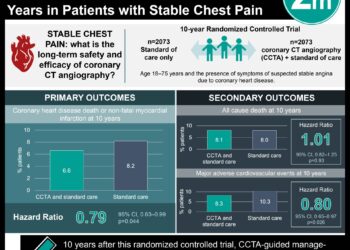Ziltivekimab antagonism of IL-6 reduces inflammation and thrombosis in patients with atherosclerotic risk factors
1. Ziltivekimab lowered high-sensitivity CRP levels, a predictor of vascular events, compared to placebo in a dose-dependent manner.
2. Thrombotic biomarkers including fibrinogen, serum amyloid A, haptoglobin, secretory phospholipase A2, and lipoprotein were lower in treatment groups compared to placebo.
Evidence Rating Level: 1 (Excellent)
Study Rundown: Prior studies, including the landmark Canakinumab Anti-Inflammatory Thrombosis Outcomes Study (CANTOS) trial, have demonstrated prevention of atherosclerotic disease via reduction of IL-6 and high-sensitivity CRP levels. The RESCUE trial—a phase 2, double-blind, randomized, placebo-controlled trial—builds on these findings to assess efficacy of ziltivekimab inhibition of IL-6 for atherosclerosis prevention in patients with chronic kidney disease and high cardiovascular risk. The results of the RESCUE trial demonstrate that ziltivekimab, a novel IL-6 ligand monoclonal antibody, is effective at reducing inflammatory and thrombotic biomarkers associated with adverse vascular events in a dose-dependent manner. These markers include high-sensitivity CRP, fibrinogen, serum amyloid A, haptoglobin, secretory phospholipase A2, lipoprotein(a), and apolipoprotein A1 to B ratios. Additionally, ziltivekimab was well tolerated, with infrequent adverse reactions associated with treatment injection and infection. The findings of this trial form the basis for future studies on cardiovascular outcomes in this patient cohort, assessing if ziltivekimab reduces rates of recurrent cardiovascular events through large-scale outcomes trials.
Click to read the study in The Lancet
Relevant Reading: Interleukin-6 Signaling and Anti-Interleukin-6 Therapeutics in Cardiovascular Disease
In-Depth [randomized controlled trial]: This trial was conducted across 40 clinical sites in the United States and enrolled 264 patients. Participants over age 18 with stage 3-5 chronic kidney disease and high-sensitivity CRP levels above 2 mg/L were eligible for inclusion. Participants were randomly distributed (1:1:1:1) among placebo or ziltivekimab 7.5 mg, 15 mg, or 30 mg groups and received subcutaneous injections once every 4 weeks for 24 weeks. The primary endpoint was defined as the change in high-sensitivity CRP from baseline compared to levels at week 12. Exploratory parameters included inflammatory and thrombotic biomarkers described above. The results of this study demonstrate that all treatment groups had significantly greater reductions in high-sensitivity CRP compared to placebo group. Additionally, higher doses of ziltivekimab were associated with more significant reductions in CRP levels (77% at 7.5mg, 88% at 15mg, and 92% at 30mg [p<0·0001 for all]). Treatment groups also demonstrated dose-dependent reductions in fibrinogen, serum amyloid A, haptoglobin, and secretory phospholipase A2 when compared to placebo. Safety and efficacy data demonstrated no severe injection-related complications, which outperforms other in-class IL-6 monoclonal antibody therapies. The limitations of this study include modest study size and reduced in-person follow up after 12 weeks due to the COVID-19 pandemic, which may have augmented CRP levels and skewed outcomes. Despite these limitations, the results of the RESCUE trial provide compelling justification for the use of ziltivekimab, a monoclonal IL-6 antibody, for reducing inflammatory and thrombotic risk factors for atherosclerotic disease in high-risk patients.
Image: PD
©2021 2 Minute Medicine, Inc. All rights reserved. No works may be reproduced without expressed written consent from 2 Minute Medicine, Inc. Inquire about licensing here. No article should be construed as medical advice and is not intended as such by the authors or by 2 Minute Medicine, Inc.







